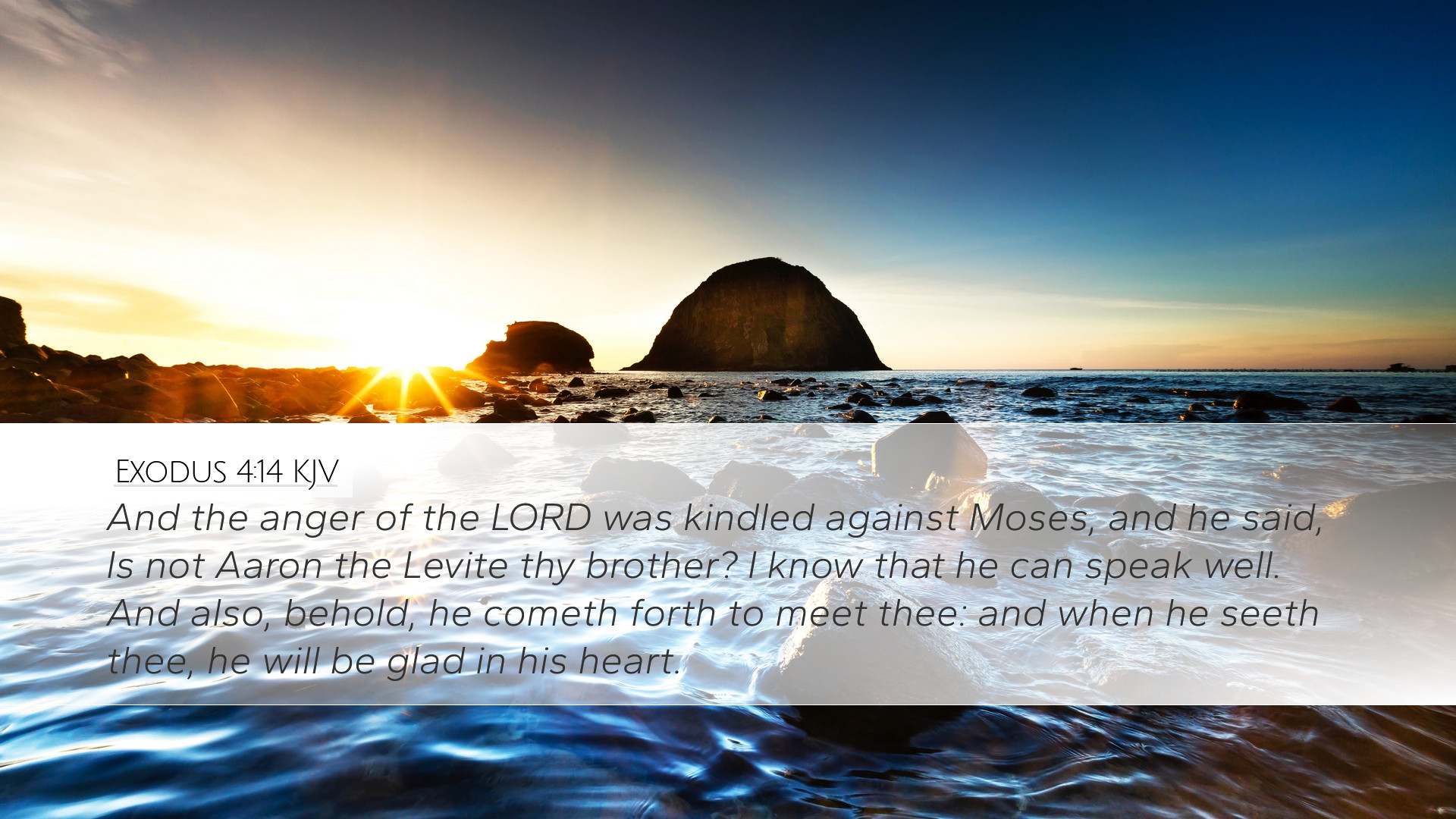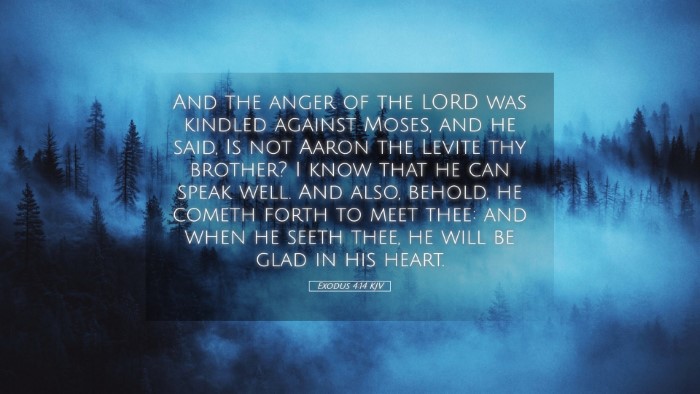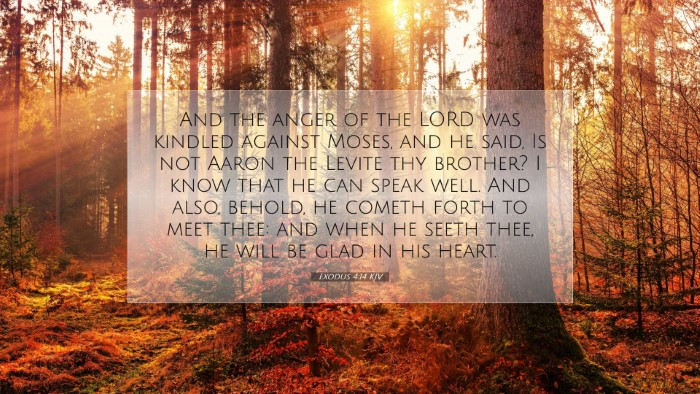Exodus 4:14 Commentary
In Exodus 4:14, we find a significant moment in the narrative of Moses’ calling. The verse reads:
"And the anger of the Lord was kindled against Moses, and he said, Is not Aaron the Levite thy brother? I know that he can speak well."
This verse encapsulates the tension between divine commissioning and human reluctance, illustrating a pivotal moment in God's plan for Israel's liberation.
Contextual Overview
This moment occurs after Moses has encountered God at the burning bush, where he receives the mandate to lead the Israelites out of Egypt. The reluctance of Moses to accept this task is evident throughout his exchanges with God (Exodus 3-4). His hesitations are not just personal struggles but reflect broader theological themes about obedience, divine sovereignty, and human agency.
Insights from Public Domain Commentaries
Matthew Henry's Commentary
Matthew Henry points out that Moses’ reluctance highlights a common human tendency to doubt one's capabilities when faced with great responsibilities. He observes that the anger of the Lord toward Moses signals the seriousness of the charge given to him. God had endowed Moses with signs and wonders, yet Moses continued to deflect the call. Henry emphasizes that, while God accommodates our weaknesses, there comes a point where His patience is tested.
-
Divine Anger: Henry notes the significance of God's anger in this context, reflecting His desire for obedience and the seriousness with which He views divine appointments.
-
Aaron as a Helper: The mention of Aaron indicates God’s provision for Moses’ inadequacies. God knows our limitations and often provides assistance through others.
Albert Barnes' Notes on the Bible
Albert Barnes emphasizes the divine response to Moses' fears. He suggests that Moses' reluctance to speak suggests a deeper spiritual struggle with his identity. Barnes highlights that God's plans will not be thwarted by human shortcomings, illustrating the notion that God empowers those He calls, and that He understands our fears better than we do.
-
Empowerment for Ministry: Barnes illustrates how the calling and commissioning of leaders often come with divine empowerment, which Moses ultimately receives through Aaron.
-
Further Divine Guidance: The mention of Aaron suggests a model of partnership in ministry, indicating that God provides support and resources when the task seems overwhelming.
Adam Clarke's Commentary
Adam Clarke provides insights into the character of Moses and the nature of his fears. He states that Moses' feelings of inadequacy were a reality that many face when they are called to significant roles in God's Kingdom. Clarke emphasizes that God’s anger was not simply a reaction but an invitation for Moses to embrace his role with assurance.
-
Understanding God’s Anger: Clarke elaborates on the nature of God’s anger; it serves as a catalyst for Moses to step out in faith, showing that divine frustration can lead to greater resolve in fulfilling God’s mission.
-
Human Limitations: Moses’ reluctance is a profound reminder that human limitations do not negate divine calling. Clarke's insights invite a reflection on the nature of divine grace that continually empowers believers.
Theological Themes
The themes presented in Exodus 4:14 resonate deeply in theological discourse. They explore the nature of God’s calling, the divine response to human limitations, and the provision of community in ministry. This passage invites reflection on how God empowers His chosen leaders even amid their fears and self-doubt.
The Nature of Divine Calling
A theological understanding of calling involves recognizing that God's plan transcends human weakness. He often calls those who feel insufficient and equips them for the tasks ahead. This resonates with the broader narrative of Scripture, where God often selects the seemingly unqualified to lead His people (e.g., David, Peter).
Community and Support
The introduction of Aaron as a partner in Moses' mission underscores the importance of support systems in ministry. Ministry is not a solitary endeavor; it is a communal calling where believers are urged to support one another. The partnership between Moses and Aaron symbolizes how God provides both the strength and the companionship required to fulfill His will.
God's Sovereignty Over Human Fears
The interactions between God and Moses reflect God's overarching sovereignty. Even when Moses hesitates, God assures him of His plan. This dynamic portrays a God who not only calls but also sustains His servants through their fears, attesting to the divine ability to work through human frailty.
Practical Application for Pastors and Theologians
For pastors, students, and theologians, Exodus 4:14 serves as a powerful reminder of the nature of God's calling. It invites reflection on personal inadequacies and the reality of divine empowerment. Here, we glean insights that are crucial for effective ministry:
-
Embrace Vulnerability: Acknowledge and embrace your limitations, as they can be platforms for God's glory. The recognition of one's inadequacies can lead to reliance on God's strength.
-
Seek Support: Establish partnerships in ministry. Like Moses and Aaron, surrounding oneself with supportive individuals can help navigate the complexities of leadership.
-
Responding to God's Call: Be prepared to act despite fear or doubt. God may kindle a ‘righteous anger’ within His servants not to condemn, but to propel them into action for His Kingdom.
Conclusion
In conclusion, Exodus 4:14 is a rich verse that offers a multi-faceted view of divine interaction with humanity. Through the tensions of fear, divine anger, and the provision for partnership in Aaron, we are confronted with the realities of God's call upon our lives. The reflections from public domain commentaries serve as a wellspring of insight, enriching our understanding and enhancing our response to God’s word. Whether in pulpit ministry, scholarly inquiry, or personal study, the lessons contained within this verse resonate deeply with the call to faithful obedience.


